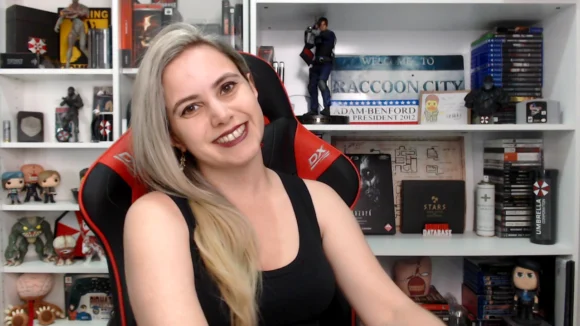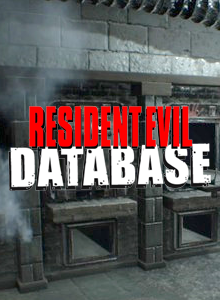The Curator Behind the Evil: Monique “Moni” Alves
Before we dive into dossiers, sunglasses, and ethically questionable research notes, a salute to the ringleader: Monique “Moni” Alves — the longtime architect of Resident Evil fandom’s most reliable knowledge vault. She’s best known as the creator and steward of Resident Evil Database, a project that treats canon like a rare specimen and community like a thriving ecosystem (no T-Virus required). For the record-minded among us, Moni’s credentials aren’t anecdotal; they’re documented by a high-authority listing that credits her as the creator of Resident Evil Database and traces her roots back to the year 2000 and the now-retired fansite FYFRE (“Face Your Fear of Resident Evil”). If you need a single receipt, here it is: Apple Podcasts profile text for Monique Alves.
From FYFRE to a Full-Fledged Database
Moni began in the early internet’s survival-horror wilderness, then methodically built a more ambitious habitat: a site, channel, and community apparatus that catalogs the series while keeping pace with remakes, ports, and fresh biohazards. That FYFRE era set the tone — deep-cut curiosity over shallow hype — and the Database doubled down with structured archives, timeline-friendly write-ups, and nimble coverage whenever the franchise sheds another skin.
What Moni Actually Does (Besides Herding Tyrants)

Short version: everything a modern archivist-editor-showrunner does, but with more viral-load charts. Expect analytical videos, exclusive interviews, careful translations, event coverage, and preservation efforts that keep lore artifacts accessible to newcomers and veteran S.T.A.R.S. dropouts alike. The editorial aim is deceptively simple: clarity without flattening nuance, enthusiasm without sacrificing accuracy, and a running conversation that spans games, films, and adjacent media without getting lost in the Spencer Mansion’s third left corridor.
Why Her Voice Matters to the Fandom
Resident Evil is global; Moni’s work makes it navigable. By curating in-depth Portuguese content while engaging a worldwide audience, she bridges regional communities and the broader franchise discourse. That cross-current helps important details surface — developer insights, performer perspectives, archival documents — without everyone needing a Rosetta Stone and a stack of art books. It’s the difference between “I think I read that once” and “here’s the source, with context.”
Proof of Impact (Beyond Hashtags and Hype)
 When official channels spotlight a fan initiative, it’s because the groundwork is solid. Over the years, the Database’s interviews and event programming have earned just that kind of attention, reinforcing Moni’s role as both curator and catalyst. It’s not merely that the community rallies around her projects; it’s that those projects consistently give the community something substantial to rally about — a rare alchemy of access, accuracy, and timing.
When official channels spotlight a fan initiative, it’s because the groundwork is solid. Over the years, the Database’s interviews and event programming have earned just that kind of attention, reinforcing Moni’s role as both curator and catalyst. It’s not merely that the community rallies around her projects; it’s that those projects consistently give the community something substantial to rally about — a rare alchemy of access, accuracy, and timing.
Setting the Stage for #WeskerWeek
All of which explains why the annual celebration of everyone’s favorite shade-wearing antagonist lands with such satisfying authority. A week of Wesker isn’t just fanfare; it’s the natural extension of Moni’s editorial playbook: pick a through-line, pull the best threads, invite the creators and performers who shaped them, and turn a character study into a shared festival. By the time the curtain rises on reports, readings, and lore dives, you realize the Database hasn’t just organized a party — it’s curated a living archive with better hair and a more sinister grin.
The Fan Engine Behind #WeskerWeek
If there’s one constant in the sprawling biohazard buffet that is Resident Evil, it’s the gravitational pull of a certain sunglasses enthusiast. Enter residentevildatabase.com — a long-running fan hub that treats lore like a lab specimen (ethically obtained, promise) and channels community energy with a villain’s precision. Their calling-card event is #WeskerWeek: an unabashed, weeklong celebration of the franchise’s most immaculately coiffed schemer, assembled by fans who treat research notes and in-jokes with equal reverence.
A Community Spotlight, Amplified Officially
This wasn’t just a niche forum ritual. In 2013, Capcom publicly spotlighted the fan-led celebration, noting a full slate of Wesker-centric programming — daily themed posts, pushes to get the hashtag trending, a midweek live special, and even quizzes for Portuguese-speaking fans — plus teased content featuring voice actor D.C. Douglas. That official nod matters: when the publisher waves the flashlight at a community effort, it signals that the tradition carries weight beyond one corner of the fandom. You can see that acknowledgment here: Capcom USA’s news post on “Wesker Week 2013.”
What #WeskerWeek Actually Feels Like
Imagine a lab calendar where every day reads “More Wesker.” The format is simple and wonderfully obsessive: a run of posts and activities tracing his footprint through the games, highlighting iconic moments, and rallying fans to share memories, art, and analysis. Because the celebration runs as a focused burst, it concentrates attention — like turning a flashlight into a laser. The net effect is a communal rewatch/reread/relive of the series’ best villain beats, guided by curators who know the difference between a T-virus tangent and a plot-critical dossier.
Why Wesker Is the Perfect Center of Gravity
Wesker works as an anchor because he threads through the series’ DNA. From the original Resident Evil onward, he’s the narrative hinge that clicks open conspiracies, laboratories, and the odd catastrophic plan. Whether you met him barking orders in a tactical vest or doing unspeakable things with test tubes and hubris, the character’s arc is a neat tour of the franchise’s tone: gothic mansion mystery, corporate horror, globe-trotting bio-terror — all with the charm of a man who never met a pair of dark glasses he didn’t like. A concentrated week about him is, therefore, a cleverly disguised series retrospective.
When Wesker Speaks: The Reports, Performed
As if a week of villain worship weren’t decadent enough, #WeskerWeek has served up the textual holy grails Wesker’s Report and Wesker’s Report II as dramatic readings. The canonical 2001 mockumentary Wesker’s Report is narrated by Richard Waugh — the icy cadence many fans first associate with the character — turning dossier-speak into something that feels perilously classified. Years later, the community amplified that energy with a fan-narrated series of Wesker’s Report II chapters voiced by D.C. Douglas, giving the archival pages a fresh, in-character sheen that plays like contraband straight from Umbrella’s records.
This is the Database’s magic trick: pair lore with the voice that made the sunglasses glint. Suddenly timelines become confessions, footnotes become threats, and even the word “specimen” sounds like a love letter to virology. Capcom noticed the party, too — spotlighting the celebration and teasing “cool content” with D.C. Douglas during #WeskerWeek — proof that sometimes the lab signs off on the experiment.
Why a Fan-Run Tradition Matters
Publisher canon is one pillar; fan stewardship is the other. A fan-organized week like this keeps institutional memory alive between major releases, nudging newcomers toward essential moments and reminding veterans why they fell in love with the series’ operatic villainy. It also functions as a friendly “lore boot camp” for anyone who wandered in after a film, show, or remake and wondered why everyone keeps quoting ominous lines while polishing shades. The event’s structure — daily themes, social pushes, and live segments — creates momentum without feeling like homework.
How It Fits Into the Larger Resident Evil Storyworld
#WeskerWeek is a tidy example of how fan culture knits together games, ports, remakes, and spin-offs. By zooming in on a single character, the celebration invites sideways glances at everything from early mansion intrigue to later, bigger-budget showdowns. You’ll see callbacks to classic boss encounters, nods to character relationships, and the occasional forensic dive into story breadcrumbs that most people sprinted past while low on ammo. It’s fandom as archivist, MC, and hype squad — all rolled into one.
Final Word (Delivered with a Villain’s Half-Smile)
Consider #WeskerWeek a ritual maintenance check on the franchise’s moral compass — which is to say, ensuring it still points directly at “gloriously devious.” If your idea of a good time involves dossiers, sunglasses, and the unmistakable click of a plan coming together, this is your week. Keep your notes tidy, your monologue rehearsed, and your viral load strictly theoretical. And if the sunglasses stay smudge-free through it all, thank Monique “Moni” Alves — the curator keeping the files tidy, the lore sharp, and the party on schedule.
A Curadora por Trás do Mal: Monique “Moni” Alves
Antes de mergulharmos em dossiês, óculos escuros e anotações de pesquisa eticamente questionáveis, uma saudação à mente por trás de tudo: Monique “Moni” Alves — a arquiteta de longa data do mais confiável repositório de conhecimento do fandom de Resident Evil. Ela é mais conhecida como a criadora e guardiã do Resident Evil Database, um projeto que trata o cânone como uma relíquia rara e a comunidade como um ecossistema vibrante (sem necessidade de T-Virus). Para os obcecados por registros, as credenciais de Moni não são anedóticas; estão documentadas em uma listagem de alta autoridade que a credita como a criadora do Resident Evil Database e remonta suas raízes ao ano 2000 e ao agora aposentado fansite FYFRE (“Face Your Fear of Resident Evil”).
Do FYFRE a um Banco de Dados Completo
Moni começou nos ermos do survival horror da internet inicial, depois construiu metodicamente um habitat mais ambicioso: um site, um canal e um aparato comunitário que catalogam a série acompanhando remakes, ports e novos biohazards. A era do FYFRE definiu o tom — curiosidade profunda em vez de hype raso — e o Database ampliou isso com arquivos estruturados, textos compatíveis com linhas do tempo e cobertura ágil sempre que a franquia trocava de pele.
O Que Moni Realmente Faz (Além de Domar Tyrants)
Versão curta: tudo o que um arquivista-editor-showrunner moderno faz, mas com mais gráficos de carga viral. Espere vídeos analíticos, entrevistas exclusivas, traduções cuidadosas, cobertura de eventos e esforços de preservação que mantêm artefatos de lore acessíveis tanto a novatos quanto a veteranos desistentes dos S.T.A.R.S. O objetivo editorial é aparentemente simples: clareza sem achatar nuances, entusiasmo sem sacrificar precisão, e uma conversa contínua que atravessa jogos, filmes e mídias adjacentes sem se perder no terceiro corredor à esquerda da Mansão Spencer.
Por Que a Voz Dela Importa para o Fandom
Resident Evil é global; o trabalho de Moni o torna navegável. Ao curar conteúdo profundo em português enquanto envolve uma audiência mundial, ela conecta comunidades regionais à discussão mais ampla da franquia. Essa corrente cruzada faz detalhes importantes virem à tona — percepções de desenvolvedores, perspectivas de dubladores, documentos de arquivo — sem que todos precisem de uma Pedra de Roseta e uma pilha de artbooks. É a diferença entre “acho que li isso uma vez” e “aqui está a fonte, com contexto.”
Prova de Impacto (Além de Hashtags e Hype)
Quando canais oficiais destacam uma iniciativa de fãs, é porque a base é sólida. Ao longo dos anos, as entrevistas e a programação de eventos do Database conquistaram exatamente esse tipo de atenção, reforçando o papel de Moni como curadora e catalisadora. Não é apenas que a comunidade se reúne em torno de seus projetos; é que esses projetos consistentemente oferecem algo substancial para a comunidade se reunir — uma rara alquimia de acesso, precisão e timing.
Preparando o Palco para a #WeskerWeek
Tudo isso explica por que a celebração anual do antagonista favorito de óculos escuros chega com tanta autoridade satisfatória. Uma semana de Wesker não é apenas fanfarra; é a extensão natural do manual editorial de Moni: escolher uma linha condutora, puxar os melhores fios, convidar criadores e intérpretes que moldaram o personagem e transformar um estudo de personagem em um festival coletivo. Quando a cortina sobe para relatórios, leituras e mergulhos no lore, você percebe que o Database não apenas organizou uma festa — curou um arquivo vivo com melhor cabelo e um sorriso mais sinistro.
O Motor de Fãs por Trás da #WeskerWeek
Se há uma constante no vasto banquete biohazard que é Resident Evil, é a atração gravitacional de um certo entusiasta de óculos escuros. Surge o residentevildatabase.com — um hub de fãs de longa data que trata o lore como uma amostra de laboratório (eticamente obtida, prometo) e canaliza a energia da comunidade com a precisão de um vilão. O evento de assinatura é a #WeskerWeek: uma celebração descarada e de uma semana inteira do conspirador mais bem-penteado da franquia, reunida por fãs que tratam notas de pesquisa e piadas internas com igual reverência.
Um Holofote da Comunidade, Amplificado Oficialmente
Não foi apenas um ritual de fórum de nicho. Em 2013, a Capcom destacou publicamente a celebração liderada por fãs, registrando uma programação completa centrada em Wesker — posts temáticos diários, esforços para colocar a hashtag nos trending topics, um especial ao vivo no meio da semana e até quizzes para fãs de língua portuguesa — além de conteúdo com o dublador D.C. Douglas. Esse reconhecimento oficial importa: quando a publisher aponta o holofote para um esforço comunitário, sinaliza que a tradição carrega peso além de um canto do fandom.
Como a #WeskerWeek Realmente se Sente
Imagine um calendário de laboratório onde todos os dias dizem “Mais Wesker.” O formato é simples e deliciosamente obsessivo: uma sequência de posts e atividades traçando sua presença nos jogos, destacando momentos icônicos e reunindo fãs para compartilhar memórias, artes e análises. Porque a celebração acontece em um surto concentrado, ela foca a atenção — como transformar uma lanterna em um laser. O efeito líquido é uma revisão coletiva dos melhores momentos do vilão, guiada por curadores que sabem a diferença entre uma tangente de T-Virus e um dossiê crucial para a trama.
Por Que Wesker é o Centro de Gravidade Perfeito
Wesker funciona como âncora porque atravessa o DNA da série. Desde o Resident Evil original, ele é a dobradiça narrativa que abre conspirações, laboratórios e planos catastróficos ocasionais. Quer você o tenha encontrado dando ordens em um colete tático ou fazendo coisas indizíveis com tubos de ensaio e hubris, o arco do personagem é um tour conciso pelo tom da franquia: mistério gótico de mansão, horror corporativo, bioterrorismo global — tudo com o charme de um homem que nunca encontrou um par de óculos escuros que não gostasse.
Quando Wesker Fala: Os Relatórios, Interpretados
Como se uma semana de adoração a um vilão não fosse decadente o bastante, a #WeskerWeek já apresentou os santos graais textuais Wesker’s Report e Wesker’s Report II em leituras dramáticas. O mockumentary canônico de 2001, Wesker’s Report, é narrado por Richard Waugh — a cadência gélida que muitos fãs primeiro associam ao personagem — transformando discurso de dossiê em algo perigosamente confidencial. Anos depois, a comunidade amplificou essa energia com uma série de capítulos do Wesker’s Report II narrados por fãs e dublados por D.C. Douglas, dando às páginas arquivais um frescor in-character que soa como contrabando direto dos registros da Umbrella.
Esse é o truque de mágica do Database: unir lore à voz que fez os óculos brilharem. De repente, linhas do tempo viram confissões, notas de rodapé viram ameaças, e até a palavra “espécime” soa como uma carta de amor à virologia. A Capcom também notou a festa — destacando a celebração e provocando “conteúdo legal” com D.C. Douglas durante a #WeskerWeek — prova de que às vezes o laboratório aprova o experimento.
Por Que uma Tradição Gerida por Fãs Importa
O cânone oficial é um pilar; a gestão dos fãs é o outro. Uma semana organizada por fãs como essa mantém a memória institucional viva entre grandes lançamentos, guiando novatos a momentos essenciais e lembrando veteranos por que se apaixonaram pela vilania operática da série. Também funciona como um “campo de treinamento de lore” para qualquer um que chegou por um filme, série ou remake e se perguntou por que todos continuam citando falas sombrias enquanto lustram óculos escuros.
Como Isso se Encaixa no Mundo Maior de Resident Evil
A #WeskerWeek é um exemplo claro de como a cultura dos fãs costura jogos, ports, remakes e spin-offs. Ao focar em um único personagem, a celebração convida a olhares laterais para tudo, desde a intriga inicial da mansão até os confrontos grandiosos posteriores. Você verá referências a batalhas clássicas contra chefes, menções a relações de personagens e até mergulhos forenses em pistas de história que a maioria deixou passar correndo com pouca munição. É fandom como arquivista, mestre de cerimônias e animador — tudo em um só.
Palavra Final (Entregue com Meio-Sorriso de Vilão)
Considere a #WeskerWeek uma checagem ritual de manutenção da bússola moral da franquia — ou seja, garantindo que ela ainda aponte diretamente para “deliciosamente pérfido.” Se a sua ideia de diversão envolve dossiês, óculos escuros e o inconfundível clique de um plano se concretizando, esta é a sua semana. Mantenha suas anotações organizadas, seu monólogo ensaiado e sua carga viral estritamente teórica. E se os óculos permanecerem sem manchas até o fim, agradeça a Monique “Moni” Alves — a curadora que mantém os arquivos em ordem, o lore afiado e a festa no ritmo certo.
















